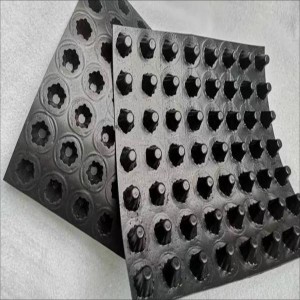Plastic drainage boards are materials commonly used in foundation reinforcement, soft soil foundation treatment and other projects. It can improve foundation performance and enhance the stability and durability of engineering structures through mechanisms such as drainage, pressure reduction, and accelerated consolidation. However, the construction process of plastic drainage boards , especially the control of verticality, has an important impact on the drainage effect and project quality.
1. The importance of verticality requirements for plastic drainage boards
Controlling the verticality of plastic drainage boards can determine the smoothness and drainage efficiency of drainage channels. If the drainage board cannot be kept vertical during the laying process, it may cause poor drainage and blocked water flow, which will affect the consolidation speed of the foundation and the quality of the project. Insufficient verticality may also cause the drainage board to deform or break under load, reducing its service life and overall performance. Therefore, the verticality of plastic drainage boards must be strictly controlled.
2. How to control the verticality of plastic drainage boards
1. Equipment selection: Choose a plate insertion machine with high precision and high stability to lay the drainage board. The board insertion machine must be equipped with a guide verticality adjustment device to ensure that it is always vertical to the ground during the installation process.
2. Construction operations: Before construction, the site must be leveled to ensure that there are no debris or potholes. When setting up the drainage board, the positioning accuracy and levelness of the board insertion machine must be strictly controlled to ensure that the drainage board is inserted vertically to the predetermined depth. It is also necessary to regularly check the verticality of the plug-in machine and adjust the deviation in time.
3. Quality monitoring: During the construction process, full-time quality monitoring personnel should be set up to monitor and record the verticality of the drainage board in real time. If it is found that the verticality deviation exceeds the specified range, the construction should be stopped immediately, the cause should be identified and corrective measures should be taken.
3. Application of verticality requirements of plastic drainage boards in actual projects
In actual projects, the verticality requirements of plastic drainage boards are generally determined based on factors such as specific project requirements, geological conditions, and specifications and models of drainage boards. Under normal circumstances, the allowable deviation of the verticality of the plastic drainage board must be controlled within ±1.5% to ensure the drainage effect and project quality.
For example, in the construction of infrastructure such as highways and railways, plastic drainage boards are commonly used in soft soil foundation treatment. At this time, the verticality control of the drainage board is very important. If the verticality is insufficient, it will lead to poor drainage, which will affect the consolidation speed and stability of the foundation. Therefore, during the construction process, the verticality of the drainage board must be controlled strictly in accordance with the design requirements to ensure the smoothness and drainage efficiency of the drainage channel.
In water conservancy projects, such as embankment reinforcement, reservoir anti-seepage and other projects, plastic drainage boards can also be used. In these projects, the verticality of the drainage slab must be strictly controlled to ensure drainage effect and project safety.
Post time: Jan-17-2025




